How to succeed in CEA (with a greenhouse, apparently)
I tend to knock vertical farms. I’ve given them an honest chance and a fair shake—even taking a group of Ball Horticultural Company executives to FarmedHere, which was housed in a former box factory in Chicago for a closer look at the phenomenon. But doggone if they don’t keep going out of business, as evidenced by my reporting on Eden Green last week. (FarmedHere closed about a year after the above-mentioned tour).
But CEA greenhouses? Absolutely! Been done for decades. So when we learned that Little Leaf Farms has opened its fourth 10-acre block of greenhouses at their McAdoo, Pennsylvania, campus, we weren’t surprised. In fact, I’m delighted to report on what seems to be a successful operation. Or, in this case, I’m delighted to let Dr. Jake Holley, editor of our Inside Grower newsletter, report on it:
Little Leaf Farms has officially opened its fourth 10-acre greenhouse in McAdoo, Pennsylvania. I’ll be honest—none of that sentence sounds real. Ten acres under glass? Their fourth? A town called McAdoo? While the facility technically sits just outside the city limits, the entire town of McAdoo spans only about 224 acres, meaning Little Leaf’s growing space alone is nearly a fifth its size.
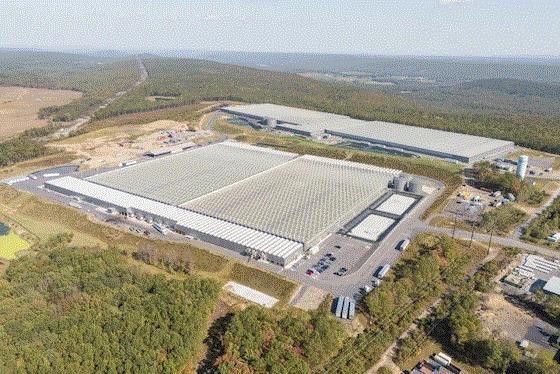 Photo from Little Leaf Farms showing the greenhouse complex in McAdoo.
Photo from Little Leaf Farms showing the greenhouse complex in McAdoo.
Now fully operational, the greenhouse range is an impressive sight from the outside. Inside, Little Leaf continues its decade-long tradition of pairing cutting-edge technology and sustainable growing practices with the high-quality standards that have made it the largest lettuce producer in North America.
You can read more about the operation in a recent issue of Inside Grower HERE.

The cobots are coming
Did you see my COVER STORY in the October GrowerTalks? I wrote about the AI revolution in greenhouses, focusing on “the autonomous greenhouse”—meaning using computer deep-learning algorithms to control the greenhouse environment much more precisely than a human grower can. And, more specifically, I wrote that AI isn't likely to replace human growers—it'll work for them almost like a really smart assistant grower, helping them grow crops faster, more efficiently and more profitably.
Danish moving gutter producer Viemose DGS also wants to do the same with greenhouse labor, which is why they’ve teamed up with robotics company 4XROBOTS, which specializes in adaptable pick-and-place robots—sometimes called “cobots”—for “collaborative robots.”
Cobot? That’s one I haven’t heard before. What makes a robot collaborative?
Unlike traditional industrial robots that operate in isolation (often inside safety cages), cobots are designed to work safely alongside humans. They have a safe design, are easy to program, can be flexibly deployed and have built-in safety sensors.
For greenhouse growers, this means a robot that can be mounted above existing systems—like Viemose’s Moving Gutter Systems—without needing expensive infrastructure changes. The cobot becomes an extra pair of hands for repetitive tasks, working alongside the human staff (or all night long, when staff is in bed). They don’t yet have any photos to share, but the illustration below shows 4XROBOTS’ Delta cobot extracting root plugs from Viemose’s gutters alongside an extremely pale human.
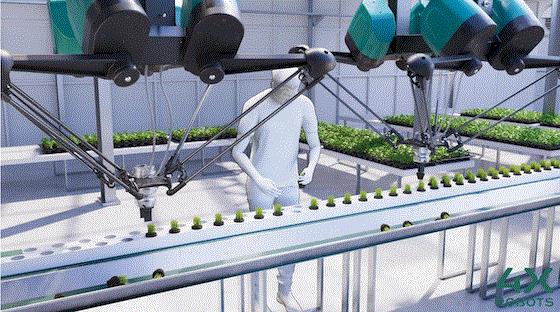
“No one wakes up excited to spend eight hours doing the same manual task repeatedly,” stated CEO Floris Berghout in a press release about the deal. “Machines should do the boring stuff. People should be operating, maintaining and innovating. That’s how you make horticulture an attractive career for the next generation.”
Viemose DGS is a familiar name in Scandinavia and Eastern Europe as one of the first suppliers of moving gutter growing systems that help streamline the production of leafy greens. One thing they're known for is scalability. Their greenhouse technologies are designed like Legos: You can start with a modest setup and expand it easily as need and budget permits. Old systems can be refurbished, new modules added. The result is flexibility and affordability.
“We want to make it easy and financially manageable for the growers to scale up and evolve on their operations,” said Floris. “The same goes for automation—it need not be all or nothing in the first go. Smart robots like collaborative robots are a good way of implementing automation little by little.”
Said Michael Mortensen, CSO of 4XROBOTS, “We believe that growers don’t want five different robots for five different very specialized jobs. They want a reliable machine that adapts to their needs during the day. Something that can easily be moved around in the system wherever it’s needed”
For employees in greenhouses, cobots mean less time spent on monotonous, repetitive work and more time for higher-value tasks such as quality control, crop care and innovation.
As soon as the partners have actual images of the cobots working alongside humans in a lettuce greenhouse, I’ll share them.

Best thing I’ve read about living and working with AI
"The real risk of AI is not that it'll replace leaders, but that it'll seduce them into mistaking information for wisdom."
That line is from the essay "The Gardener and the Machine: Rethinking Leadership for the Post-Knowledge Age," which Ellen Wells shared with me and her fellow editors last week. It’s timely because more and more people are becoming nervous about artificial intelligence and the potential negative impacts it could bring to society, including the loss of jobs. But this story offers hope for those wanting to know how they can fit into the brave new world of AI. And it offers a warning to those who think big data and deep learning are a substitute for an experienced human.
Here are a few lines from the blog post by Mark Béliczky:
Artificial Intelligence has achieved what Peter Drucker once called the triumph of knowledge. It can summarize, simulate and predict with astonishing speed—yet it cannot understand. AI holds humanity’s accumulated intelligence, but not its lived wisdom.
Knowledge, Drucker reminded us, must be improved and applied through judgment—or it vanishes. Understanding must be cultivated. It grows through reflection, experience and relationship—through what no machine can replicate: meaning.
If AI represents the triumph of knowledge, leadership represents the renewal of understanding. Leadership, at its best, transforms purpose into pattern—aligning human energy toward value that endures—value that compounds when purpose, trust and accountability move in rhythm.
Then the author makes an interesting analogy, comparing future leaders to gardeners:
For more than a century, leaders were trained to think like engineers—to build, control and optimize. But organizations today resemble ecosystems more than machines: interdependent, adaptive and unpredictable.
David Hurst describes this shift as the move from the commander to the gardener. The gardener does not dictate growth; they cultivate the conditions for it. They know when to prune and when to wait, how to protect what’s fragile and regenerate what’s spent.
This ecological metaphor is more than poetry. It describes how modern organizations survive. Leadership is no longer about designing perfect systems; it is about nurturing healthy ones—balancing efficiency with adaptability, structure with emergence and continuity with change.
This makes me think of some of the best business leaders I know. Most folks in the business know what to do and how to do it. The best of the best take it one step further: they know WHY they do what they do. That’s what the author is saying we humans have the potential to do what AI currently can’t do.
And, lastly, this line, which sums it all up:
AI can inform, but it cannot care. It can process data, but not discern meaning. Leadership, therefore, becomes the act of re-attaching intelligence to experience—ensuring that what we know still serves what we value.
Read (and discern, as only a wise human can) the entire blog post HERE.

Poinsettia trials time at Heimos and Plantpeddler
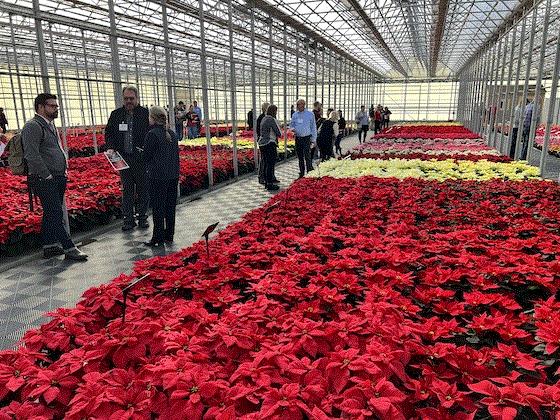
Alright, you Midwestern fans of poinsettias—it’s time to book your visit to two of the best poinsettia trials in the country: N.G. Heimos (now Hoffmann Heimos) near St. Louis and Plantpeddler in bucolic* Cresco, Iowa. Both will showcase well over 100 poinsettia varieties from every breeder in the world, including Beekenkamp, Dümmen Orange, Graff, Rinehart, Lazzeri, Selecta and Suntory, and have breeder reps on hand to talk about their varieties and answer your cultural and marketing questions. Both are grown just like they do in production—it’s a real-world test, not a breeder fashion show.
The Hoffmann Heimos trial (their 18th!) in Millstadt, Illinois, will be Thursday, November 20, from 8:00 a.m. to 3:00 p.m., with a light breakfast and hearty lunch provided. Special-rate lodging is available at the Hampton Inn in Columbia, Illinois (just mention the trial when you book). For more information about the trials, please email Susie Hines or call (618) 476-3617.
The Plantpeddler Poinsettia Trial will be Thursday, December 4, from 9:00 a.m. to 3:00 p.m., with lunch included. Plantpeddler is calling theirs “a record trials, with over 200 commercial and pre-release varieties.” Rooms are available at the (almost world-famous) Cresco Super 8 Motel. Register for the trial through their WEBSITE or call (800) 827-1654 and ask for Stacy Bryant. Oh, a pre-event social and dinner is planned for Wednesday evening at Atomic Pizza in downtown Cresco.
*Relating to the pleasant aspects of the countryside and country life. Also, a nice way of saying “middle of nowhere.”

More CAST updates—including two new exhibitors!
I mentioned a few weeks ago that Benary was moving its California Spring Trials base of operations from Watsonville up by Gilroy down to the middle of the trials in Santa Barbaraa—specifically at Por la Mar Nursery. Well, a few more changes to add to that one:
- Global Plant Source, which represents the Israeli breeding and propagating companies Cohen, Hishtil, Saad Assaf and Jaldety, said they're also moving out of Watsonville and heading south to Santa Barbara—specifically the Polo Club, which is already hosting eight other trial displays, so that'll be a big and busy trial stop!
- Walters Gardens will be presenting at CAST! The perennial propagator and Proven Winners partner will be at—wait for it—the Santa Barbara Polo Club. (Did I mention it was going to be a big stop?)
- Express Seed Company will be joining Danziger and ThinkPlants at Headstart Nursery in Gilroy (right behind Garlic World),where Danziger has exhibited for years. (Thank goodness! I was afraid they were going to the Polo Club.)
The official dates for CAST 2026 are March 24-27—Tuesday through Friday.
Official online registration will open by January 2; until then, you can begin planning your schedules now by using the trip planner found HERE.

Take two squirrels and call me in the morning
My editors are widely read! Editor Jen Polanz shared a bit of news that we plant people know, but which others seem to be taking more seriously now: Some doctors are actually writing formal prescriptions telling their stressed-out patients to get outside.
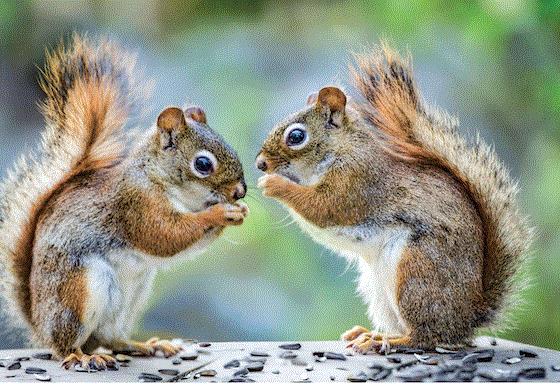 Well, it’s not a “real” prescription—it’s actually a way to get more serious about offering the advice that getting outside is good for your health. Research has repeatedly shown that spending time in natural areas can lower blood pressure, reduce stress hormones and boost immunity. So why don’t folks get outside more? Said one doctor, “When I bring it up, it is almost like granting permission to do something they may see as frivolous when things seem so otherwise serious and stressful.”
Well, it’s not a “real” prescription—it’s actually a way to get more serious about offering the advice that getting outside is good for your health. Research has repeatedly shown that spending time in natural areas can lower blood pressure, reduce stress hormones and boost immunity. So why don’t folks get outside more? Said one doctor, “When I bring it up, it is almost like granting permission to do something they may see as frivolous when things seem so otherwise serious and stressful.”
Read the full story HERE.
Congrats to ASCFG founder Judy Laushman!
Our friend Judy Laushman, co-founder of the Association of Specialty Cut Flower Growers (ASCFG) and its executive director for 35 years, has been honored with the 2025 John H. Walker Award from the Society of American Florists. The award, named for SAF’s longtime executive vice president John H. Walker, honors floral association executives for their outstanding leadership. Judy certainly fits the bill!
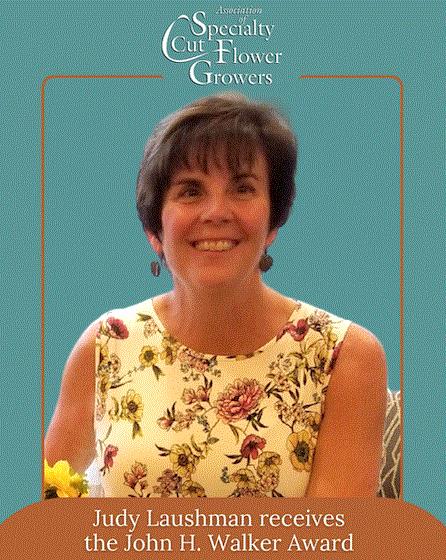
“Judy built something truly special,” said Dr. John Dole, professor of horticulture at North Carolina State University and an ASCFG advisor. “Her leadership created not just an association, but a community.”
Judy stepped into the ASCFG executive director role in 1988 and established bold initiatives that still define ASCFG today. Just one year into her tenure, she launched the association’s magazine, The Cut Flower Quarterly. She also spearheaded the National Cut Flower Trial Program, now in its 32nd year, which has evaluated more than 1,500 cultivars. Her hands-on coordination of seeds, testers and reporting has helped bring numerous staple crops to market.
Other standout initiatives include Localflowers.org, a vibrant platform promoting locally grown blooms, and the ASCFG’s National Conference, a cornerstone of education and community-building since 1989.

Indoor Ag-Con program to feature Nine Crop and Sector tracks
Indoor Ag-Con, the largest trade show and conference for the controlled environment agriculture (CEA) and vertical farming industry, has unveiled its 2026 Conference Program, featuring an all-new lineup of nine crop and sector tracks along with a speaker roster that's growing daily.
The 13th edition of the event will be held February 11-12, 2026, at the Westgate Las Vegas, bringing together growers, business leaders, suppliers, policymakers, academics, researchers and other industry members from around the globe to explore the latest trends, technologies and opportunities shaping the future of controlled environment agriculture.
The 2026 conference program introduces dedicated tracks for:
- Lettuce/Herbs
- Vine Crops
- Mushrooms
- Berries
- Cannabis
- Conventional Agriculture
- Unique Approaches to CEA
- General Applications
- Expo Theater Sessions (on the show floor)
The tracks will feature presentations, panels and fireside chats offering practical, actionable takeaways for operators, investors and innovators. The Expo Theater sessions, located on the show floor, will spotlight timely discussions on cybersecurity threats in CEA, AI-driven automation, smart system integration, crop diversification strategies and real-world production insights from leading growers.
Stay tuned for announcements about the keynote speakers for the event.
And don’t forget the trade show floor, which will feature top brands and innovative newcomers showcasing cutting-edge products, technologies and services across lighting, climate control, automation, substrates, irrigation, facility design and more.
Early Bird Registration is now open. To register and learn more about conference sessions, exhibiting suppliers and networking opportunities, go HERE.

IPM to offer “Young Entrepreneurs Day”
Recognizing the importance of the next generation to the continued success of our industry, the organizers of the giant IPM trade fair in Essen, Germany, have announced a day of events during IPM to foster networking and collaboration among the younger members of its audience.
Young Entrepreneurs Day will be Wednesday, January 28, in Hall Europa. It'll begin at 10:00 a.m. with a keynote talk by the musician, extreme athlete and entrepreneur Joey Kelly, who'll convey how determination, discipline and perseverance can help to overcome personal and business challenges—qualities that are also crucial for young leaders in horticulture.
Next, various horticulture associations will present how they're supporting the next generation of entrepreneurs. Then an event called “speed dating,” in which the participants get to know one another, make valuable contacts and lay the foundation for future collaborations.
Then at 1:00 p.m., attend an informal networking get-together “to deepen conversations and explore new ideas” before visiting the trade fair in the afternoon.
Participation in the Young Entrepreneurs Day is free of charge, but REGISTRATION is required.

The garden center trip of a lifetime
You missed the chance to visit garden centers around Cape Town, South Africa, with the International Garden Centre Association last week. Pity! But I missed it, too. However, from the pictures I saw from my Facebook friends, it was spectacular! But don’t worry—you can sign up for next year’s “congress” (as they call the event, as it includes a short annual business meeting) of Munich, Germany. It’s slated for August 16-22, 2026.
Laurie and I have done eight IGCA tours, every one of them uniquely memorable. We dined with the president of Ireland, drank saki in Tokyo, cruised the Rhine in Germany, got an insider’s tour of the Musée d’Orsay in Paris, rode the Golden Railway in the Swiss Alps … and have seen more than 100 of the most interesting garden centers in the world in the company of the most talented garden center owners and managers in the world. An IGCA tour is a treat!
Go HERE and you can see a couple of videos about the IGCA tours—including one I produced for them some years ago featuring frequent attendees (most from the U.S.) talking about what they love about the IGCA tours.

Finally …
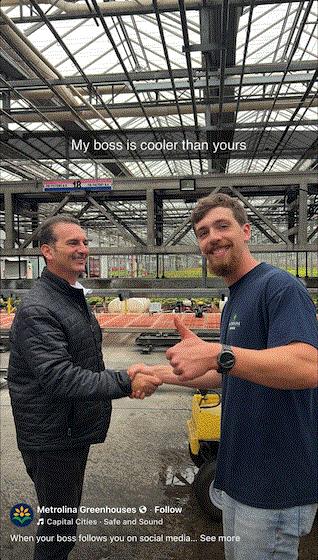
If you want an idea about how to use social media for your greenhouse operation, check out Metrolina’s Facebook “Reels.” They’ve been popping up randomly on my Facebook page and I can’t not click on them. I especially love THIS CLEVER ONE showing what to do when you discover that your boss is following you on social media. You post images of yourself happily enjoying every aspect of your job, no matter how dirty, and wrapping up with “My boss is cooler than yours.”
Meanwhile, in the Netherlands, Beekenkamp is doing it, too—in their case, in an effort to attract new employees.
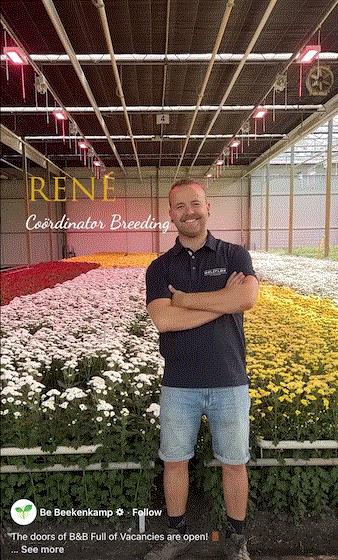
You can follow along as Cindy, René, Dennis, Henry and others give you a look at what they do for a living. They’re in Dutch, but you get some pretty views of the greenhouse and their impressive young plant automation.
Feel free to email me at beytes@growertalks.com if you have ideas, comments or questions.
See you next time!

Chris Beytes
Editor-in-Chief
GrowerTalks and Green Profit
This e-mail received by 29,764 loyal readers!
Thanks to my loyal sponsors, who help me reach the 29,728 readers of Acres Online in more than 60 countries. Want to be one of them (a sponsor, that is)? Give Kim Brown a shout and she will tell you about our many advertising opportunities.